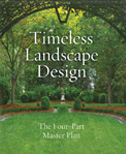Timeless Landscape Design

 When I was a landscape architecture student, my coursework on residential landscape design wasn’t much to speak of — just one project in a single course. In those days, in fact, expressing any interest in residential spaces made you something of an outcast who really should have been thinking of loftier pursuits in civic, public and commercial design.
When I was a landscape architecture student, my coursework on residential landscape design wasn’t much to speak of — just one project in a single course. In those days, in fact, expressing any interest in residential spaces made you something of an outcast who really should have been thinking of loftier pursuits in civic, public and commercial design.
Happily, I’ve been hearing from some younger landscape architects that the situation is now different — but that there’s still no real focus on residential design and a tremendous void when it comes to good, solid information for those who want to know more. And it goes without saying that, when it comes to pools and other watershapes, that void is particularly deep and wide.
Certainly, resources such as WaterShapes have helped professionals fill the void, but as a diligent book person, I am always on the lookout for texts that add to the dialogue and do more than skim over the residential-landscape canvas. That’s why I was keen to pick up a copy of Timeless Landscape Design, written by the husband-and-wife landscape design team of Mary Palmer Dargan and Hugh Graham Dargan (Wyrick & Co., 2007).
They aim at readers who do not have degrees in landscape architecture but who do (or should) have a distinct interest in the topic — nursery professionals, general contractors and homeowners among them. Indeed, the content is a bit basic, but for watershapers who want to address entire residential environments, I see this 190-page, beautifully illustrated book as a useful overview of how all the pieces can work together.
The Dargans approach the design process by breaking it into four areas:
>> The Approach: They start with driveways, street and sidewalk transitions, front yards and pathways leading to front doors — coverage I found useful because more and more of the projects I design include areas beyond backyards. And they get down to details, displaying some terrific treatments of gates, mailboxes, pathways, landings and steps.
>> The Hub: Here, the Dargans discuss the role of the home itself as a component of the landscape and how its architecture influences the structures and spaces that surround it. They also cover the importance of understanding how to organize exterior spaces to maximize viewing corridors and vistas from inside the home.
Now you can purchase the title reviewed here — and other books reviewed by Mike Farley — through our online WaterShapes Store! Click here.
>> The Perimeter: This section covers all of the areas and structures directly related to the house — details that provide transitions out to the landscape that include terraces, patios, porches, shade structures, arbors, pergolas and exterior dining areas. Interestingly, they cover pools in this section, pointing out that these can be perimeter elements as well as destinations.
>> Passages and Destinations: Here they cover design elements that lead us away from the home and out to destinations such as lawns, tennis or basketball courts, gardens, gazebos, entertainment areas or other structures and spaces that are somehow removed from the house itself.
Certainly, this isn’t an exhaustive text on residential landscape design, but even so, it offers far more information than I ever received in college and seems to me to provide a sound approach to assessing the big picture and finding ways to make all the pieces fit together as parts of a cohesive design.
Again, this may be too basic a treatment for those who’ve immersed themselves in all facets of residential design, but in my view it never hurts to see how other professionals approach the design challenge. And for those of you who are eager to get into areas beyond watershapes only, this is a great place to start.
Mike Farley is a landscape designer with more than 20 years of experience and is currently a designer/project manager for Claffey Pools in Southlake, Texas. A graduate of Genesis 3’s Level I Design School, he holds a degree in landscape architecture from Texas Tech University and has worked as a watershaper in both California and Texas.









